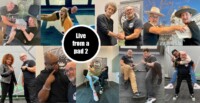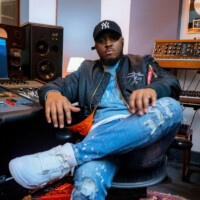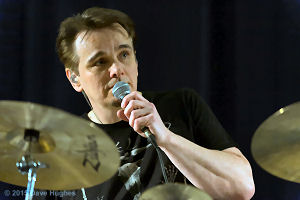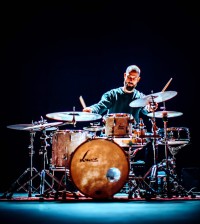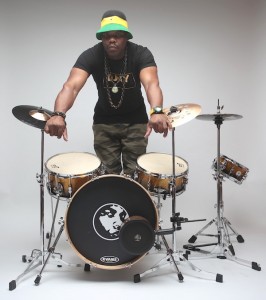 Jazz and hip hop influenced swag grooves with a hint of church background, a producer’s hat on and an eye-catching set up – that’s Daru Jones.
Jazz and hip hop influenced swag grooves with a hint of church background, a producer’s hat on and an eye-catching set up – that’s Daru Jones.
His unique style has made him an in demand drummer in his recent home base Brooklyn, NY playing for the likes of Jack White, Slum Village, Talib Kweli, Jon B and many more – all the while working on his own projects and being a music producer and independent record label owner. Now, having moved to Nashville, TN, Jones is out for new adventures.
Daru is currently touring with UK soul singer Jamie Lidell & The Royal Pharoahs and I caught up with him in London to chat about his upbringing, his work on and off stage and his quite curious set up.
You had a wide variety of influences growing up. Was jazz the strongest, seeing as you play traditional grip?
I started playing in church when I was four years old. My mum and dad are both musicians, they play organ and piano, and I had a lot of cousins and uncles that played and was inspired by watching them. Some of my mentors put me onto jazz. One of them introduced me to the Buddy Rich memorial series; the one with Dave Weckl, Vinnie Colaiuta and Steve Gadd. Coming up in church everybody played matched grip but seeing Weckl and Vinnie on that tape I just thought that’s a cool way to hold the stick. It was definitely inspired by them. I then went on to find out about Buddy Rich, Gene Krupa and all these guys and just decided I wanted to learn that grip. It was kind of a big deal because everybody else played matched grip.
You do swap between grips a lot now, don’t you?
Yes, I go between both. When I want to get more volume, when playing rock, sometimes I switch it over just to get that bit more out of it.
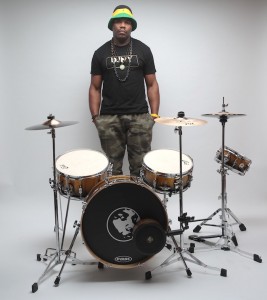 Where did it go from there? Did you learn from teachers or more in church?
Where did it go from there? Did you learn from teachers or more in church?
Basically I learned how to play by ear. One of the strengths that people noticed when I was younger was that I could hear something one time and mimic it. It was a lot easier at that time mimicking the gospel guys because it wasn’t as complexed as when I started listening to Weckl and Vinnie. They were a lot more complex and there was no YouTube back then, everything had to be transcribed by ear – which I think gave me edge. There was no cheating, you had to listen to it and try to figure out how they’d do it.
When I was in high school my mum put me in chart reading lessons which introduced me to the rudiments. Paradiddles and all that. Basically I was playing that stuff but I didn’t know what it was called. I also learned how to sight read. I’m rusty on it now but it opened me up.
When I was 14 I played in this gospel jazz trio with this guy who was the music director of the stage plays where people would act and had a band that would play the music. We were invited to do this gospel music play that featured Vanessa Bell Armstrong. They had the band set up under the band so you couldn’t see us but after it finished people went: “Man, who was that band?!”. They came to meet us and complimented. That gave me the confidence and I decided I want to do this for real. It was the start of me taking this seriously.
I started getting more into the other jazz players and DCI was releasing all these VHS instructional video tapes. Peter Erskine and all those guys. It was a whole world and I just went in and shedded all of that stuff.
One thing that I noticed about the drummers, they had their own identity with their set ups, so I tried to emulate that. I did the Weckl set up for a while, Vinnie’s set up, Erskine’s set up and so. The same mentor then put me onto Tony Williams and Jack DeJohnette and it just went over my head, it was just too far ahead. That took me a while. Then I got the Tony Williams live in New York and I just watched that every day and slowly figured out what was going on. I just knew I wanted to do drums and dove into everybody that was out at the time.
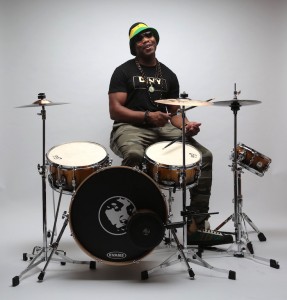 So after the conscious decision of making this your living, did you study music?
So after the conscious decision of making this your living, did you study music?
No, I just went straight into it. Being in school I was into hip hop and more so into the production aspect, not really the content because a lot of the content wasn’t positive. A lot of profanity. I grew up in church, I couldn’t really listen to that. I was always fascinated with the producers though and wanted to know who made the beats. I started getting into Dr. Dre, Dj Premier, Wu-Tang Clan came out, RZA and all these. Eventually my mum put me in organ lessons and one day when I went there, the teacher had a drum machine. My mind was blown. What is that? You can make beats on that?! I begged my mum to get me one, she did and I started learning how to make patterns. I tried emulating different composers and through that got into producing and sampling. I had a lot of great mentors.
Your band ‘The Ruff Pack’ is on a hiatus at the moment but you’ve got a new project. Tell me about that.
Yes, I started a new band called DMD. It’s myself (D); Marcus Machado (M) who also plays guitar in the Jamie Lidell touring band, The Royal Pharaohs; and Doug Wimbish (D), the bassist from Living Colour.
The project comes out next month and we’ve already released a single two months ago called ‘After Dark’. It’s really cool. Doug comes from the old school Disco influence and brings that certain energy. Marcus is one of the best up and coming guitarists. I really like this band because I feel like we’re all on the same page musically. We all have the same goals: mixing funk, rock’n’roll, jazz, hip hop and try to keep the culture going.
It’s all instrumental but the goal is to hopefully do featuring artists with us as the backing band. Big shout out to The Roots, that’s what they did and what helped pushed them in different directions. Like The Meters, that’s pretty much the vibe.
We’re looking to tour as soon as possible too. The only thing is that Living Colour is coming out with a new album in the Fall so we’re working around Doug’s schedule. We’ve already played the New Orleans Jazz Fest though.
Other than that me and Marcus have a duo project called D.Stubs & M.Drix. We’ve released a beat tape past November and are basically playing cover songs of some of our favourite artists: D’Angelo, D Dilla and so on. It’s just us playing those songs with our swag and that’s what keeps us busy when Doug is not available.
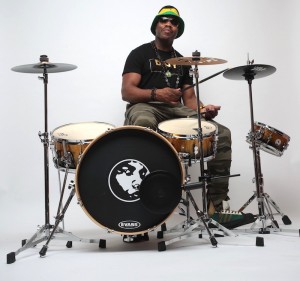 You’re here in London touring with Jamie Lidell and The Royal Pharaohs. How did that come about?
You’re here in London touring with Jamie Lidell and The Royal Pharaohs. How did that come about?
Yes. The Royal Pharaohs is Jamie’s latest touring band. I’m the musical director so I helped put it all together. The band is split between musicians from Nashville and New York, both cities have amazing players.
Jamie also lives there now. It’s crazy, I got the recommendation for working with Jamie via Pino Palladino. He’s a good friend of mine and recommended me when Jamie started recording his album. I got the gig, recorded on the album and when Jamie wanted to start touring, he asked me to put the players together. We did a tour in 2016 with a three week long European run. That’s when we also played at KOKO with a full 7-piece Royal Pharaohs. This time around the band got downsized and just played the Jazz Cafe. I haven’t played there since 2010 but I always love playing at the Jazz Cafe. The energy is crazy and people loved it. It’s always good when that happens because London is a tough place: either they like you or they don’t. [laughs]
You’re also working with Jack White. Tell me more about that.
Yes, I’ve played on both album: Blunderbuss and Lazaretto – and toured both records with him. It’s been an amazing experience.
Jack White is used to Meg White and her unique style. How do you approach replacing her?
I wanna say a big shout out to Meg White. Me being a producer, I can understand her concept. Listening to The White Stripes a lot of their music reminds me of hip-hop samples breaks because the fact that it’s not complex is their foundation. When I get hired by anybody my goal is to please the artist, my boss, because I wanna work. If there are arrangements that are produced, I know the audience want to hear what they heard on the record. I knew this time around Jack wanted to do something different so we had to take what was a 2-piece band and make it into a 5-piece. That was a challenge right there because non of these extra layers existed. My approach to what Meg played is: if it’s not broken, don’t fix it. Even though it’s simple, that’s what I want to play because that’s how they got their fans. I thought about how to add my spice, so I play the beats and when I get the chance I add my little swag in. For the most part thought I keep the foundation. It’s funny because Jack didn’t want us to play the music like the records but I made the decision to stick to it.
It was a lot of pressure too because Jack is a drummer. He can play! If you have a gig and your boss is a drummer you wanna make sure you’re on point. Luckily he is a fan of what I was doing and wanted me to bring my background in. I’m very thankful, it’s been a career change for me. Going from hip hop to rock’n’roll is like night and day.
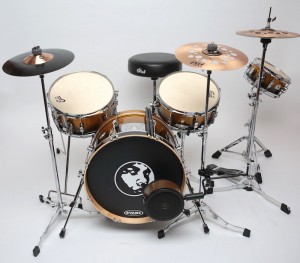 You’ve mentioned already that you also produce a lot. You have your own label ‘Rusic Records’ which specialises in “Soulhop”?
You’ve mentioned already that you also produce a lot. You have your own label ‘Rusic Records’ which specialises in “Soulhop”?
Yeah, Soulhop simply is soul music and hip hop combined. Soul for me is anything you play that comes from your heart and soul. I feel like that’s the aggression, even when I’m drumming. When I’m doing that showmanship stuff, the standing up, that’s no gimmick, I’m doing it because I feel like it at the moment and I wanna connect with the audience. Same thing with my production, I’m making beats from my heart and soul. A lot of my production is hip hop influenced, lots of loops and hard hitting beats.
Rusic comes from my name Daru and the word music. Take the ‘m’ off and put the ‘r’ on. I had that vision when I was a teenager and I’m thankful that I stuck with it. The internet definitely helped creating awareness of what I do.
What helped me to be a little bit unique at the time was that my mum was a choir director so she collected a lot of old school gospel records, so I always sampled gospel music.
People weren’t doing that and it created the whole Soulhop thing. It’s a certain, more positive energy that I want Rusic Records to represent.
The producing itself came out of curiosity?
It came out of being influenced by and loving hip hop and wanting to know what attracted me towards the music. It wasn’t necessarily the rappers, that came later. I was wondering who was making the beat and wanted to know how to do that. Initially I started to learn how to work the drum machine. A mentor showed me how to use the Akai S900 sampler.
I had a Casio sampler too that was proper old school. It had four buttons. I used to synchronise the two and make beat tapes. So yeah, I’ve been at it for a while. I didn’t always have the best gear, I just used what I had. I’m thankful for my upbringing, I had to work for everything and learn the hard way. Especially coming up in church: we had so many drummers, if you were dragging a beat, you were pushed off and replaced. That’s where I learned to be a team player. It’s not about me and what I can do, it’s about making everybody sound good. I learned that early.
You have fairly recently moved from New York to Nashville. What prompted that move?
I still love New York and I’m there on a regular basis but I just wanted to focus on my own projects. When I’m in New York I always work for hire and you get burned out after a while.
I have my label and want to start putting out my own things, I don’t want to always focus on other peoples projects. The opportunity came, I knew Jack was in Nashville, and I also wanted to expand and get more into the rock’n’roll and country world. I like to do different stuff, that was the whole inspiration.
How is the scene in Nashville nowadays? Is it still this ‘session heaven’?
The thing about Nashville is there are a lot of great players who have been in that scene for a long time and they all try to hold onto it. Right now there are a lot of people moving to Nashville so it’s changing the whole climate. You have to make some space for the people coming in. It’s a lot of politics but luckily I have my own name and I’ve been working with Jack, so they are more open. It’s still challenging though.
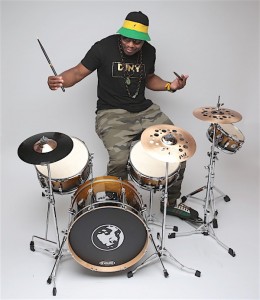 You’ve mentioned your fascination signature set ups earlier yourself. Now, if I’ve ever seen a signature set up, it’s yours.
You’ve mentioned your fascination signature set ups earlier yourself. Now, if I’ve ever seen a signature set up, it’s yours.
Man… it’s taken years though. You know how it is: when we have our heroes we look up to them and want to use everything they’re using but I knew at some point it has to be my mission to find my identity. Eventually I started experimenting and that’s what came about it. It was of course inspired by the traditional grip – Gene Krupa was one of my favourites – and watching the old school guys I thought I’d try to put the floor tom at an angle. I sit really high as well. It was all an experiment and I did it just for looks. It took me time to even figure it out myself. That’s one thing with hip hop, the community is all about being original and having something that will make you stand out. It was kind of backwards for me. The most challenging thing was figuring out how to do my fills because I was used to playing a regular five piece kit. It definitely made me more selective of what I play.
Talking about gear, you have a travel friendly signature drum kit with PDP?
It’s definitely a dream come true. I had the idea even when I played with other brands but I’m glad they gave me the opportunity. When I joined DW, there was another brand I endorsed and played before, they had a small compact kit and I thought ‘Man, I need those sizes’. I had DW design me a compact kit just for my personal use. I always thought it would be cool to do something with that, the opportunity came, I told them the concept and it worked out. It’s a travel friendly kit, three bags, so you can carry everything with both hands. My favourite part is the lightweight stands. We drummers always have to carry our own things but the heaviest thing is the hardware bag. These lightweight stands really safe the day! Also, being in New York we sometimes play two or three gigs a night. With that kit I can just go on the subway or get a cab. It’s not a cheap shell so it doesn’t loose the quality of the sound. For that size it sounds massive
You also have quite a unique set of signature cymbals.
Yes, I think a year ago I went to the Paiste factory in Switzerland. I was blown away by seeing how they design a cymbal from the beginning. I was telling the guys that it would be cool to have something you can just throw in your backpack. If we get called to do a jam session or somebody is playing and they call us up, you can just take the cymbals out.
I thought it would be cool to make them all the same size. They thought it was a good idea so they designed the DJs 45 and they’re all the size of a vinyl, 12”. I was blown away – especially by the ride. The bell sounds like a big bell. Also it has the Rusic Records logo on it, so it really looks like a vinyl record. I’m very thankful. Luckily they came out at the same time as the kit. It’s crazy how that all worked out.
Finally, what’s next?
The DMD project coming out, get it in stores and tour with that. I’m also working on my own solo project. Just doing instrumentals right now, not sure if I wanna leave it like that or get vocalists or rappers on it. It’s a mixture of hip hop and rock.
I’m also gonna be doing a clinic at PASIC in November and possibly one at a drum convention in France. The clinics are kind of coming in right now, I’d love to do more.
I just saw Jack White recently but the last thing I did with him just came out in April. We did a new song called ‘Battle Cry’ which is kind of like a new ‘Seven Nation Army’, an anthem for the stadiums. I’m hoping he wants to get back in the studio soon.
Thanks a lot for your time Daru!
Interview by Tobias Miorin
October 2017

